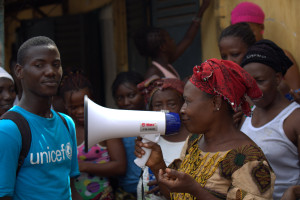Denial of Ebola
Key Considerations

As part of the Ebola sensitization, UNICEF asked community members to repeat what they have learned about Ebola. UNICEF Guinea
When fear of a disease is high, but people lack the confidence and skills to do anything about their fears, one common result is denial of the problem. When dealing with the issue of denial, consider the following:
Manage fear by balancing the risk of getting Ebola with action items to protect from Ebola. Messages should include a place to get more information (e.g., community leader, hotline number).
Community members tend to trust and listen to HWs, religious leaders, family and friends—consider campaigns that engage HWs, local role models or change agents to discuss the facts about Ebola and how to model positive behaviors.
Important people to involve in your communication efforts
HWs, CHWs and volunteers, Ebola task forces, district health teams, Ebola survivors, local champions, religious and community leaders and mass media
|
Common Causes/ Contributing Factors |
Sample Message Response |
Sample Activities and Implementation |
|
Lack of accurate information about Ebola/rumors
High fear, low confidence and skills to take action to protect oneself, resulting in denial
|
Ebola is real. However, you can protect yourself, your family and your community. Early treatment of Ebola increases your chance of survival and may prevent spread to your family and your community.
Do not touch a sick person with Ebola or someone who has died from Ebola.
Speak with your local community leader if you suspect Ebola in your community or call the Ebola hotline (XXXX) for advice.
Ebola causes sudden high fever, extreme tiredness, headache, body pain and loss of appetite. If you fall sick with these symptoms after contact with a person with Ebola or after attending a funeral, go to the nearest health facility.
|
HW and CHW training on Ebola communication, radio distance-learning program for CHWs or community volunteers
Community and religious leader training about Ebola and their role in stopping transmission
Call-in radio show with trusted sources (e.g., HWs) talking about Ebola prevention, and Ebola survivor stories
Community and school activities such as community theater and games that teach about Ebola
Print materials, such as Ebola protection action cards, Ebola job aids, hording boards, posters, etc.
Call center with hotline number to answer questions about Ebola
Religious sermons that teach about Ebola, but do not blame community members for Ebola
|
